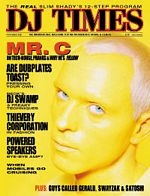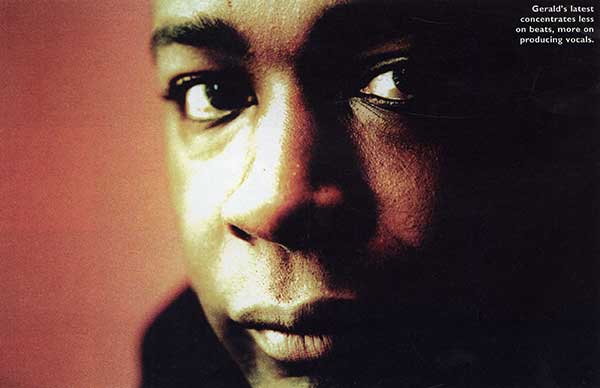| A Guy Called Gerald - Returns To Find A New Essence | |
 |
DJ Times Vol. 13, Number 11 November 2000 Page: 16 |
 Of course, that's a very definitive statement from an artist (née Gerald Simpson) who has experienced both the major and independent sides of the music industry. In the late 1980s, the Manchester, England-based Simpson was a member of 808 State and had a significant hand in crafting the classic "Pacific State." After leaving the group, he signed to Mancunian indie imprint Rham and released "Voodoo Ray," a seminal acid-house era anthem. After his first album, Hot Lemonade, was released also on Rham, he signed to CBS and put out Automanikk, which was a gel of Detroit techno and Chicago house. However, the label didn't release its follow up - hence, the misgivings. But after that experience, Simpson thrived in the underground and established his own Juice Box label, from which he put out his two following LPs, 28 Gun Bad Boy (aggressive jungle) and Black Secret Technology (with a more mellow vibe). He's also traveled extensively DJing his intoxicating drum-n-bass sounds. Five years since his last full-length, Simpson, now residing in New York, comes forth with Essence (Stud!o !K7), which focuses less on beats, more on vocals and he's looking to translate his whole operation live. "I've done the LP, so a lot of the songs can be played live, that's what I had in mind," he says. "The LP before I was dying to take it out on the road, but there was no possible way to do that. It was really synthetic. There was melodies, but it was really studio whereas this one was basically done to take it more live. The parts are more defined, more organic." A listen to initial single "Humanity" - sung by Louise Rhodes - bears this out. Full of emotive moments, the ethereal dn-b cut features a confident, sultry performance by Rhodes, who easily croons and scats over a skittering Simpson breakbeat. And other cuts like the breezy "Hurry to Go Easy" (featuring former Deee-Lite singer Lady Kier) are certainly a far cry from the sonic whooshes of earlier material like "Voodoo Ray" or "F/X." Though his music has changed, his basic studio approach has not. For nearly a decade, Simpson, who came from a synthesizer background, has used samples in a clever fashion. "I don't Puffy Combs in my samples," he says. "[I use] bits and pieces, make it unrecognizable. I think that's the whole goal." He's used Roland and Akai gear from the beginning. His setup includes an S950 sampler, an S1000 keyboard, the new S series Akai, old Roland analog synths and drum machines, Alpha Juno (for strings and horns), Juno 106 (for basslines), SH 101, MPU I01 (to convert old analog synths to MIDI), Jupiter 8 ("I'm old school"), JD8000 and he doesn't use a computer. Akai MPC60 and 3000XL units are taking the place of the computer for sequencing purposes. "Watching the screen as the cursor thing goes by puts me to sleep," he chuckles. "I forget all about the music. I hear that in what people are doing. I like closing my eyes and really vibing out. The more sound I've got and the less visual the more important. I write as I go along. If I'm watching blocks, I tend to get distracted." Plugging outboard equipment into the DJ set up is what started Simpson's career. "I got to a stage where my keyboards outgrew the turntables," he remembers. "I had two turntables. I had a drum machine plugged in there. I got a 303, plugged that in. I had a 101 that didn't fit, so I had to buy a mixer. The turntables ended up being plugged into the mixer. There was not enough space for two turntables, so I ended up with just one turntable. I enjoy DJing. It's one of them things if I'm in the studio, you think I want to chill out and you get on the turntables and do a mix and you go back to what you were doing." Simpson says he's used to the effects-filled Pioneer DJM-500 mixer, but he also likes the Roland DJ-2000 mixer because it has a kill-switch mechanism where you can filter out the bassline and it features a MIDI output. "I started trying to incorporate a Korg drum machine in my DJ set," he says. "There's DJ equipment that Roland makes that people don't make much use of when they go out DJing, which they should do - it's really simple." Contemplating the myriad of options DJs now have brings Simpson back to a time when DJs weren't considered artists or musicians - a condition that's thankfully changed. "[Equipment companies] weren't really looking at the DJ market before," he recalls. "People like me were buying second-hand 909s and 808s that people were throwing out because we couldn't afford the latest equipment. Building our studio out of second-hand Roland equipment made them regurgitate that whole system. For them not to realize that we even exist out here, then to have out DJM-500 and MC-303 now..." He stops and reconsiders just how much times have changed. "I remember phoning them up and asking for a manual for an 808 I had just bought and I slipped in about sponsorship - and they said they already had Phil Collins." [Author: Lily Moayeri] |
|